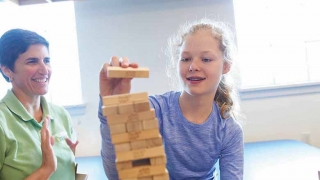 Sitting on a sofa in her suburban Philadelphia living room, wispy blond hair pulled back in a ponytail, braces crowding her ready smile, 12-year-old Grace Haupt looks like any happy-go-lucky sixth-grader.
Sitting on a sofa in her suburban Philadelphia living room, wispy blond hair pulled back in a ponytail, braces crowding her ready smile, 12-year-old Grace Haupt looks like any happy-go-lucky sixth-grader.
But Grace’s preteen world, filled with friends and homework, field trips and family fun, differs from that of her peers in one important way: Grace has Friedreich’s ataxia, a progressive neuromuscular disease that causes loss of coordination in the arms and legs as well as muscle weakness and fatigue.
The condition, FA for short, is relatively rare — only about 5,000 people in the U.S. have it — and there is, as yet, no cure. Children with FA frequently develop curvature of the spine and an enlarged heart.
New center dedicated to Friedreich's ataxia research
This spring, with Penn Medicine, CHOP established the Friedreich’s Ataxia Center of Excellence — the first of its kind in the nation — dedicated to fostering FA research and clinical care and discovering and developing drugs to treat the disease. The center was established with a $3.25 million gift from the Friedreich’s Ataxia Research Alliance (FARA), as well as support from the Hamilton and Finneran families. CHOP, FARA and Penn Medicine have long been at the forefront of FA study, collaborating on research and clinical trials to pinpoint the metabolic dysfunction at its root.
David Lynch, MD, PhD, is co-director of the center and also directs CHOP’s Friedreich’s Ataxia Program. Deeply involved with FA research for 15 years, he remains hopeful for a cure: “What motivates me is the possibility of contributing to treatments and therapies to come and helping this group of sincere, intelligent individuals.”
Grace's path to diagnosis
Lynch has been Grace’s doctor since she first began showing symptoms in pre-K. Teachers had noticed her losing her balance and bumping into people, which led her parents, Holly Hedrick, MD, the Louise Schnaufer Endowed Chair in Pediatric Surgery at CHOP, and Hans Haupt, MD, a cardiothoracic surgeon with Penn Medicine, to embark on a year of wide-ranging tests until the diagnosis was confirmed in 2007.
Though Holly is a doctor herself, she remembers behaving like any anxious mom: “I would be Googling late at night to try and get more information, then I’d go into her room and watch her sleep.”
A love of learning and electronics
Grace doesn’t dwell on her disease. Though she is often tired by the end of her school day, she loves learning and is a voracious reader with a keen scientific mind.
Tinkering with electronics is her passion, and she has been known to ask for alligator clips and cables for Christmas. “I love playing around with circuit boards,” she says, “and I want to make my own inventions.”
The family’s great provider of facts, Grace is often called on to help sister Lily, 11, and brother Henry, 10, with their schoolwork. “The good news,” says Grace, “is that my brain will always be healthy.”
An early riser, Grace likes to catch up on fiction before the beginning of the school day. Reading and writing inspire Grace.
“She is able to lose herself in her books and stories,” says Grace’s mom. “She once told me that she loved to write because she can do all the things in her stories that she is not able to do in real life.”
Continuing care
Since just walking across the room can be exhausting for Grace, she gets around at school in a motorized scooter and wears a back brace for her scoliosis. Regular physical therapy sessions help keep her strength up, and she also enjoys riding a recumbent bike, often taking trips to the local Starbucks with her mom.
Every year in the fall, Grace and her family take part in Ride Ataxia, a bike ride happening Oct. 12 this year to raise money for FA research.
Grace visits CHOP many times per year for neurology, cardiology, orthopedics, physical and occupational therapy and to see Dr. Lynch.
“We always say we go to Dr. Lynch for an injection of optimism,” says Holly. “He is our community’s champion and cheerleader and counselor and source of great hope. We know we are getting the best care, delivered in a way that makes us all really part of the team.”
Sharing latest FA research and treatments
With leadership and support from Holly, CHOP now puts on an annual FA symposium where families from all over the world — Ireland, California, Alaska, South Dakota — gather to learn about the latest research and treatments. The parents appreciate the information, while the children have fun playing together, knowing they are not alone in facing FA.
For Holly it’s just one more reason she is thankful for CHOP.
“No matter where we lived in the country or world,” she says, “I would come to CHOP for Grace’s care. No question.”
By Judy Hill